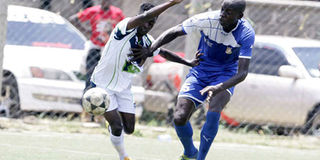Corporate funding critical for sports economy

Chrispinus Onyango (left) of KCB Football Club tussles for the ball with James Nthiga (Police FC) during the Football Kenya Federation National League match on September 15, 2018 at Camp Toyoyo in Nairobi. The sports sector has the potential to contribute to the economy. PHOTO | CHRIS OMOLLO | NATION MEDIA GROUP
What you need to know:
- We should monetise sports through tailored rights management, create an enjoyable fan experience through events management and content packaging for broadcasters' and sponsors' needs.
- The best bet is a well-managed property that derives value for its followers and consequently attracts corporate sponsorships.
For decades, our long distance world-beating athletes have perfected their well-timed trademark finishing kick to podium glory — equivalently not so much for collective sport in Kenya that has always failed to deliver.
While some Kenyan team sports and individuals have excelled — the Shujaa national rugby sevens team, the Wanyama brothers footballing firsts in Europe, Kenyan-born Tour-de-France great Chris Froome, the swimming Dunford scions — this success has not been pervasive in their respective disciplines.
Still, this infrequent success is proof that Kenya has the talent to build its sports economy. Why this does not happen needs a special Ouija board to decipher.
No body of knowledge exists on the real economic value of our sports or the opportunity cost of underinvesting in sports. Conjecture points to millions of dollars.
SPORTS ECONOMY
The global sports industry, at one per cent of the world’s gross domestic product (GDP), is estimated to be worth $600-$700 billion (Sh60-70 trillion), according to KPMG’s The Business of Sports 2016 Report.
This comprises the value created around sports events, infrastructure, hospitality, training and manufacturing and retail of goods.
Mind-boggling figures indeed. So much so that the European Union has taken note. A commissioned 2012 Study on the Contribution of Sport to Economic Growth and Employment in the EU as of 2005 found the sports sector able to turbo-charge the continent to its Europe 2020 goals.
It found its rising sports sector to have a share in the national economies comparable to agriculture, forestry and fishing combined.
Its share of total employability was higher than its share of value added; it had the ability to foster convergence across EU states and had a multiplier effect of growth-enhancing specialisation advantages all contributing to a little north of 450 billion euros.
Given that Kenya is a mecca of athletics and genuine crown-prince of global sevens rugby, it should follow that the sports sector is an important player — only that creating value and monetising the sector is a convoluted mix that goes beyond the pontificating.
MONETISE SECTOR
Tilting this status quo requires a re-evaluation of the role of sports in the economy, backed by a long-term blueprint, chaperoned by experts with the nous for a turnaround story.
Only then can we gatecrash into the virtuous circle of sports value chain that includes sports properties (Kenya Premier League, Kenya Rugby Union League, Stanbic Bank National Sevens Circuit, clubs and so on) that need to be made valuable.
We should monetise these through tailored rights management, create an enjoyable fan experience through events management and content packaging for broadcasters' and sponsors' needs.
At the crux of such elevated conversation is funding the existing properties, an area Kenya has underwhelmingly trudged — tossing in the bin an opportunity to leverage sports power in facilitating socio-economic development.
While government has supported sports through funding before, we have barely scratched the surface.
UPLIFTING THE YOUTH
The best bet is a well-managed property that derives value for its followers and consequently attracts corporate sponsorships.
An archetypical model is the Stanbic Bank National Circuit Series.
The package goes on to fund six clubs to organise the tournament (in six towns) that acts as the selection platform for the national team for the coming season.
Already in a long-term relationship with top tier side Mwamba RFC, the bank’s aim is to continuously invest in growing and developing the game.
Stanbic also supports a football festival at Mathare Youth Sports Association, which engages, inspires and encourages youth to have a positive impact in Nairobi’s underprivileged slum communities.
Such efforts can be bettered if the government, sports stakeholders and the private sector improve the sports economy ecosystem. Only then can we reap the fruits of a true sporting nation that Kenya is.
The writer is Stanbic Bank’s senior manager for communication and events




